-
 Bitcoin
Bitcoin $113900
-1.39% -
 Ethereum
Ethereum $3517
-4.15% -
 XRP
XRP $3.009
1.59% -
 Tether USDt
Tether USDt $0.9997
-0.04% -
 BNB
BNB $766.8
-1.41% -
 Solana
Solana $164.6
-2.38% -
 USDC
USDC $0.9998
-0.02% -
 TRON
TRON $0.3277
0.65% -
 Dogecoin
Dogecoin $0.2023
-1.67% -
 Cardano
Cardano $0.7246
0.05% -
 Hyperliquid
Hyperliquid $38.27
-4.77% -
 Sui
Sui $3.528
-0.52% -
 Stellar
Stellar $0.3890
-0.73% -
 Chainlink
Chainlink $16.16
-2.69% -
 Bitcoin Cash
Bitcoin Cash $539.9
-4.38% -
 Hedera
Hedera $0.2425
-2.00% -
 Avalanche
Avalanche $21.71
-0.97% -
 Toncoin
Toncoin $3.662
5.73% -
 Ethena USDe
Ethena USDe $1.000
-0.02% -
 UNUS SED LEO
UNUS SED LEO $8.964
0.35% -
 Litecoin
Litecoin $107.7
2.33% -
 Shiba Inu
Shiba Inu $0.00001223
-0.40% -
 Polkadot
Polkadot $3.617
-0.97% -
 Uniswap
Uniswap $9.052
-2.49% -
 Monero
Monero $295.1
-3.79% -
 Dai
Dai $0.9999
0.00% -
 Bitget Token
Bitget Token $4.315
-1.85% -
 Pepe
Pepe $0.00001060
0.11% -
 Cronos
Cronos $0.1342
-2.72% -
 Aave
Aave $256.0
-0.87%
How can Chinese investors buy Bitcoin ETFs through ODI?
Chinese investors face complex hurdles accessing Bitcoin ETFs via ODI, requiring thorough due diligence, regulatory compliance, and professional guidance to navigate successfully.
Mar 29, 2025 at 02:14 pm
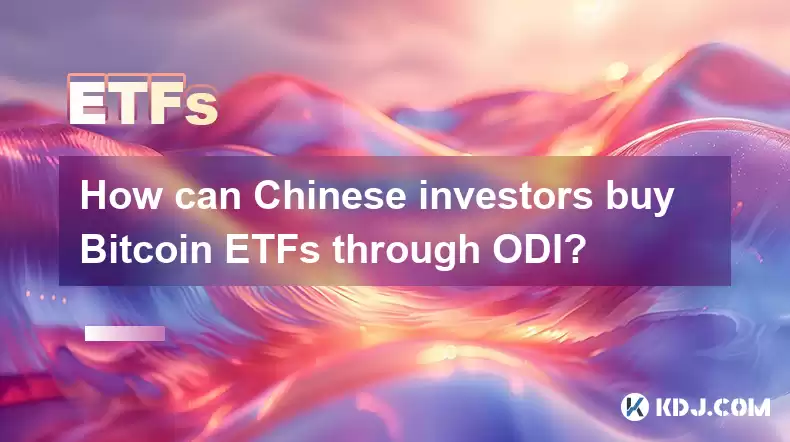
Understanding the Challenges and Opportunities
Chinese investors face unique hurdles when attempting to access Bitcoin ETFs, primarily due to capital controls and regulatory restrictions within China. The Qualified Domestic Institutional Investor (QDII) program doesn't currently permit direct investment in Bitcoin ETFs. However, the Outward Direct Investment (ODI) route offers a potential pathway, albeit a complex one fraught with legal and logistical challenges. Understanding these complexities is crucial for any investor considering this approach.
Navigating the ODI Process for Bitcoin ETF Access
ODI allows Chinese entities to invest overseas. While it doesn't explicitly exclude Bitcoin ETFs, the process is stringent and requires significant preparation. Obtaining the necessary approvals from Chinese regulatory bodies is the first and most significant hurdle. This involves a detailed application process, demonstrating the investment's legitimacy and alignment with Chinese regulations. Failure to meet these stringent requirements can lead to rejection.
- Thorough due diligence on the chosen Bitcoin ETF is paramount. Investors must carefully examine the ETF's prospectus, management fees, and underlying assets to ensure they align with their investment goals and risk tolerance. Understanding the ETF's investment strategy and potential risks is essential.
- Selecting a reputable and experienced intermediary is crucial. These intermediaries will navigate the complex ODI application process, manage the transfer of funds, and provide ongoing support. Choosing an unqualified intermediary can significantly increase the risk of delays or rejection.
- Complying with all relevant regulations and reporting requirements is non-negotiable. Transparency and accurate reporting are key to a successful ODI application and ongoing compliance. Failure to comply can lead to severe penalties.
- Understanding the tax implications of investing in Bitcoin ETFs through ODI is essential. Investors should consult with tax professionals to ensure they are compliant with both Chinese and the relevant foreign tax laws. Tax implications can vary significantly depending on the investor's residency and the ETF's jurisdiction.
- Managing currency exchange risks is crucial. Fluctuations in exchange rates between the Chinese Yuan (CNY) and the currency of the ETF's listing exchange (e.g., USD) can significantly impact returns. Implementing appropriate hedging strategies can mitigate this risk.
Understanding the Regulatory Landscape
The Chinese government's stance on cryptocurrencies remains cautious. While not explicitly banning all cryptocurrency-related activities, it actively discourages speculative trading and maintains strict controls on capital flows. Any attempt to use ODI for Bitcoin ETF investment must be fully compliant with all applicable Chinese regulations. Non-compliance can result in significant penalties.
The regulatory environment is constantly evolving, making it crucial for investors to stay updated on the latest developments and interpretations of existing rules. Regularly reviewing relevant regulations and seeking expert advice is essential to ensure continued compliance. Ignoring these updates can lead to unexpected legal consequences.
Practical Considerations for Chinese Investors
The costs associated with using ODI for Bitcoin ETF investment can be substantial. These costs include intermediary fees, legal fees, and potential currency exchange fees. Investors must factor these costs into their overall investment strategy.
The time required to complete the ODI process can be lengthy, often involving several months of paperwork and approvals. Investors should anticipate delays and plan accordingly. This extended timeframe can impact investment timing and strategy.
The complexity of the ODI process necessitates a high level of financial literacy and understanding of international investment regulations. Investors lacking this expertise should seek professional advice from qualified financial advisors and legal professionals. Improper navigation of the process can lead to significant losses.
Frequently Asked Questions
Q: Are there any legal restrictions on Chinese citizens buying Bitcoin ETFs through ODI?
A: Yes, while ODI allows for outward investment, the process is heavily regulated and requires significant approvals from Chinese authorities. The regulatory landscape is constantly evolving, and non-compliance can lead to severe penalties.
Q: What are the potential risks involved in using ODI to buy Bitcoin ETFs?
A: Risks include regulatory hurdles, intermediary risks, currency exchange rate fluctuations, and the inherent volatility of Bitcoin itself. Thorough due diligence and professional advice are crucial to mitigate these risks.
Q: What documents are typically required for an ODI application to invest in Bitcoin ETFs?
A: The exact documentation requirements can vary, but generally include detailed investment plans, proof of funds, identification documents, and potentially legal opinions confirming compliance with Chinese regulations.
Q: How long does the ODI application process typically take?
A: The timeframe can vary significantly, often ranging from several weeks to several months, depending on the complexity of the application and the efficiency of the regulatory review process.
Q: What are the typical fees associated with using ODI to invest in Bitcoin ETFs?
A: Fees include intermediary fees, legal fees, currency exchange fees, and potentially other administrative costs. These fees can be substantial and should be factored into the investment budget.
Q: Is it advisable for all Chinese investors to pursue Bitcoin ETF investment through ODI?
A: No. The process is complex, expensive, and carries significant risks. It is only suitable for sophisticated investors with a high risk tolerance and a deep understanding of the regulatory landscape. Professional advice is strongly recommended.
Disclaimer:info@kdj.com
The information provided is not trading advice. kdj.com does not assume any responsibility for any investments made based on the information provided in this article. Cryptocurrencies are highly volatile and it is highly recommended that you invest with caution after thorough research!
If you believe that the content used on this website infringes your copyright, please contact us immediately (info@kdj.com) and we will delete it promptly.
- Worldcoin, Identity, WLD Price: Decoding the NYC Crypto Buzz
- 2025-08-02 21:10:12
- Shiba Inu: Utility and Community Strength Drive Crypto's Evolution
- 2025-08-02 21:50:12
- Crypto Donations, Trump PAC, and Bitcoin: A New York Minute on Political Coin
- 2025-08-02 20:30:12
- Crypto Market Under Pressure: Bearish Momentum and Rising Volatility Take Hold
- 2025-08-02 20:30:12
- Crypto Market Carnage: Liquidations Soar as Ethereum and Bitcoin Take a Beating
- 2025-08-02 21:55:12
- DeFi Token Summer Gains: Is Mutuum Finance the Real Deal?
- 2025-08-02 18:30:12
Related knowledge
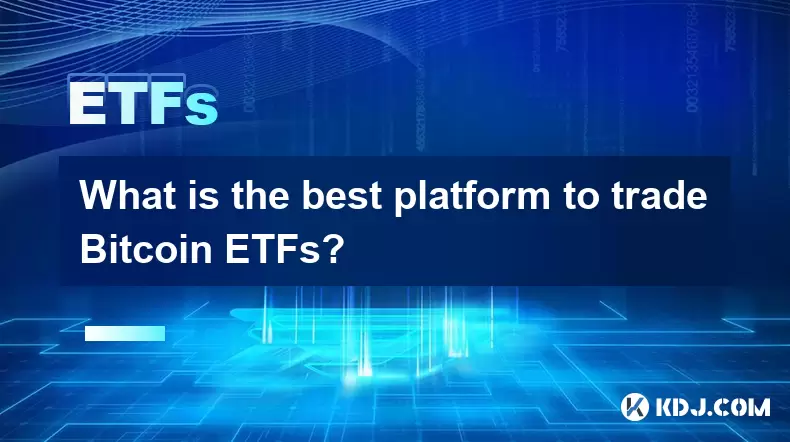
What is the best platform to trade Bitcoin ETFs?
Jul 23,2025 at 04:14am
Understanding Bitcoin ETFs and Their Role in TradingBitcoin Exchange-Traded Funds (ETFs) have gained significant traction among traditional and crypto...
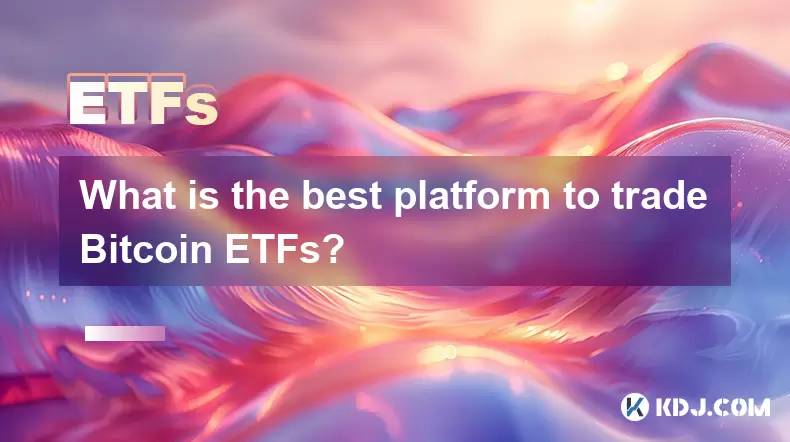
What is the best platform to trade Bitcoin ETFs?
Jul 17,2025 at 03:50pm
Understanding Bitcoin ETFs and Their Role in the MarketBitcoin Exchange-Traded Funds (ETFs) are investment vehicles that track the price of Bitcoin wi...
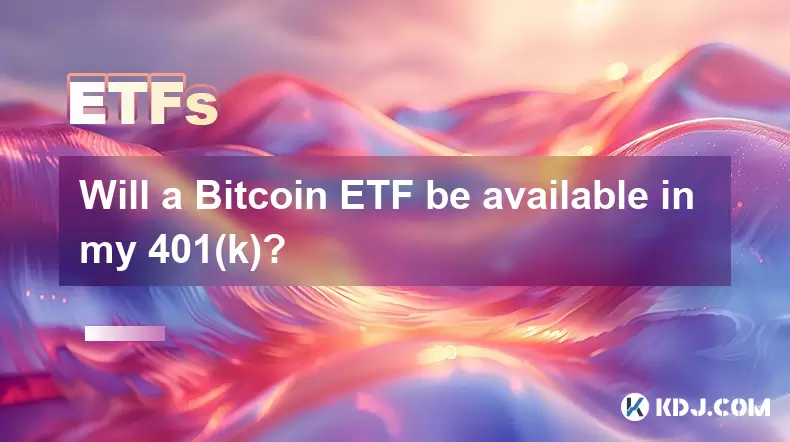
Will a Bitcoin ETF be available in my 401(k)?
Jul 17,2025 at 10:42pm
What is a Bitcoin ETF?A Bitcoin ETF (Exchange-Traded Fund) is an investment vehicle that tracks the price of Bitcoin without requiring investors to di...
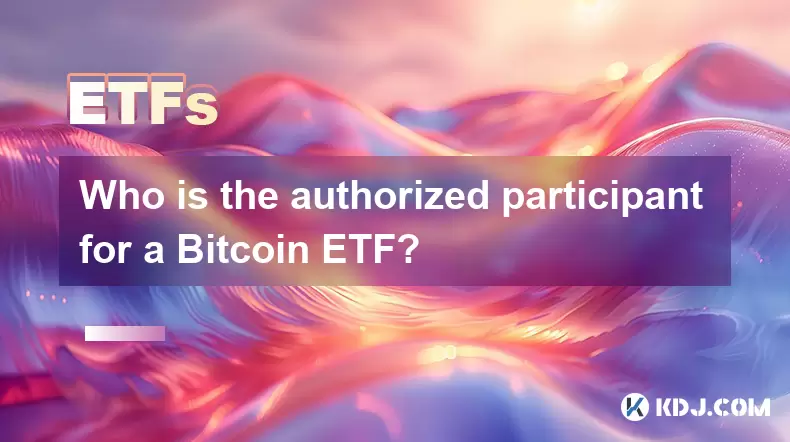
Who is the authorized participant for a Bitcoin ETF?
Jul 18,2025 at 12:42am
Understanding the Role of Authorized Participants in Bitcoin ETFsIn the context of Bitcoin Exchange-Traded Funds (ETFs), an authorized participant (AP...
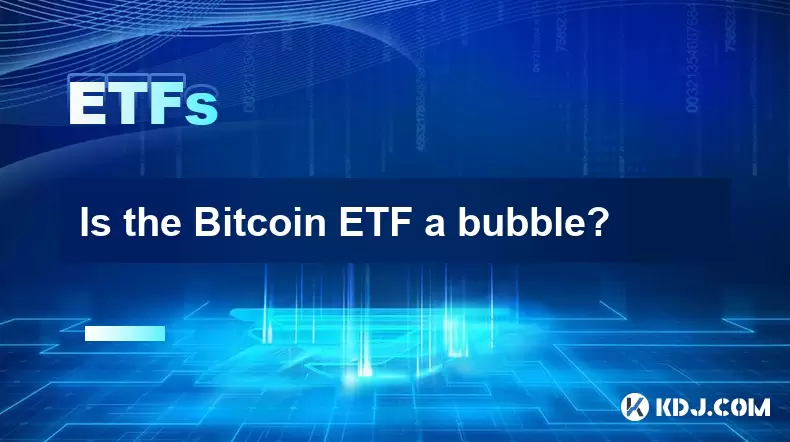
Is the Bitcoin ETF a bubble?
Jul 20,2025 at 06:57am
Understanding the Bitcoin ETF ConceptA Bitcoin Exchange-Traded Fund (ETF) is a financial product that aims to track the price of Bitcoin without requi...
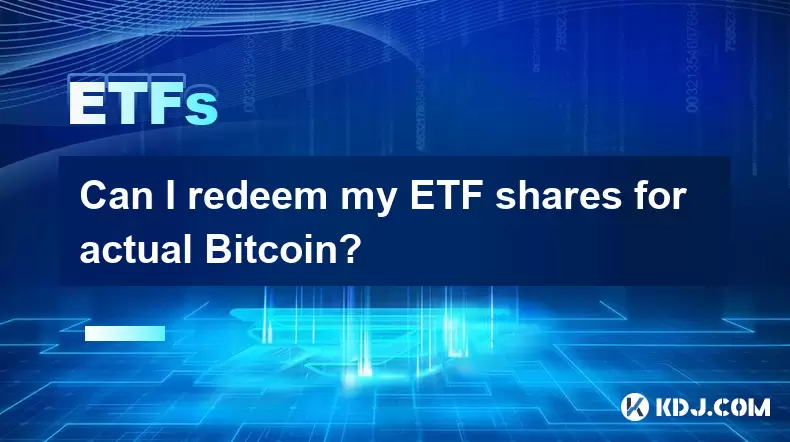
Can I redeem my ETF shares for actual Bitcoin?
Jul 17,2025 at 03:14pm
Understanding ETF Shares and Their Relation to BitcoinExchange-Traded Funds (ETFs) have become a popular investment vehicle for those looking to gain ...

What is the best platform to trade Bitcoin ETFs?
Jul 23,2025 at 04:14am
Understanding Bitcoin ETFs and Their Role in TradingBitcoin Exchange-Traded Funds (ETFs) have gained significant traction among traditional and crypto...

What is the best platform to trade Bitcoin ETFs?
Jul 17,2025 at 03:50pm
Understanding Bitcoin ETFs and Their Role in the MarketBitcoin Exchange-Traded Funds (ETFs) are investment vehicles that track the price of Bitcoin wi...

Will a Bitcoin ETF be available in my 401(k)?
Jul 17,2025 at 10:42pm
What is a Bitcoin ETF?A Bitcoin ETF (Exchange-Traded Fund) is an investment vehicle that tracks the price of Bitcoin without requiring investors to di...

Who is the authorized participant for a Bitcoin ETF?
Jul 18,2025 at 12:42am
Understanding the Role of Authorized Participants in Bitcoin ETFsIn the context of Bitcoin Exchange-Traded Funds (ETFs), an authorized participant (AP...

Is the Bitcoin ETF a bubble?
Jul 20,2025 at 06:57am
Understanding the Bitcoin ETF ConceptA Bitcoin Exchange-Traded Fund (ETF) is a financial product that aims to track the price of Bitcoin without requi...

Can I redeem my ETF shares for actual Bitcoin?
Jul 17,2025 at 03:14pm
Understanding ETF Shares and Their Relation to BitcoinExchange-Traded Funds (ETFs) have become a popular investment vehicle for those looking to gain ...
See all articles

























































































